Examsrevision
On this page, you find all documents, package deals, and flashcards offered by seller ExamsRevision.
- 1359
- 0
- 172
Community
- Followers
- Following
42 Reviews received
1531 items
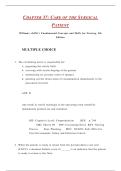
Test Bank for Fundamental Concepts and Skills for Nursing 6th Edition by Patricia A. Williams {Chapter 36-41}
Chapter 36: Administering Intravenous Solutions and Medications Chapter 37: Care of the Surgical Patient Chapter 38: Providing Wound Care and Treating Pressure Ulcers Chapter 39: Promoting Musculoskeletal Function Chapter 40: Common Physical Care Problems of the Older Adult Chapter 41: Common Psychosocial Care Problems of Older Adults
- Package deal
- • 6 items •
- CHAPTER 38: PROVIDING WOUND CARE AND TREATING PRESSURE ULCERS {Williams: deWit's Fundamental Concepts and Skills for Nursing, 5th Edition} • Exam (elaborations)
- CHAPTER 39: PROMOTING MUSCULOSKELETAL FUNCTION {Williams: deWit's Fundamental Concepts and Skills for Nursing, 5th Edition} • Exam (elaborations)
- CHAPTER 40: COMMON PHYSICAL CARE PROBLEMS OF THE OLDER ADULT {Williams: deWit's Fundamental Concepts and Skills for Nursing, 5th Edition} • Exam (elaborations)
- CHAPTER 41: COMMON PSYCHOSOCIAL CARE PROBLEMS OF OLDER ADULTS {Williams: deWit's Fundamental Concepts and Skills for Nursing, 5th Edition} • Exam (elaborations)
- CHAPTER 36: ADMINISTERING INTRAVENOUS SOLUTIONS AND MEDICATIONS {Williams: deWit's Fundamental Concepts and Skills for Nursing, 5th Edition} • Exam (elaborations)
- And more ….
Chapter 36: Administering Intravenous Solutions and Medications Chapter 37: Care of the Surgical Patient Chapter 38: Providing Wound Care and Treating Pressure Ulcers Chapter 39: Promoting Musculoskeletal Function Chapter 40: Common Physical Care Problems of the Older Adult Chapter 41: Common Psychosocial Care Problems of Older Adults

CHAPTER 37: CARE OF THE SURGICAL PATIENT {Williams: deWit's Fundamental Concepts and Skills for Nursing, 5th Edition}
MULTIPLE CHOICE 1. The circulating nurse is responsible for: a. preparing the sterile field. b. assisting with sterile draping of the patient. c. maintaining an accurate count of sponges. d. pointing out the observation of contamination immediately to the personnel involved. ANS: D Any break in sterile technique in the operating room should be immediately pointed out and remedied. DIF: Cognitive Level: Comprehension REF: p. 748 OBJ: Theory #9 TOP: Circulating Nurse KEY: Nur...
- Package deal
- Exam (elaborations)
- • 19 pages •
MULTIPLE CHOICE 1. The circulating nurse is responsible for: a. preparing the sterile field. b. assisting with sterile draping of the patient. c. maintaining an accurate count of sponges. d. pointing out the observation of contamination immediately to the personnel involved. ANS: D Any break in sterile technique in the operating room should be immediately pointed out and remedied. DIF: Cognitive Level: Comprehension REF: p. 748 OBJ: Theory #9 TOP: Circulating Nurse KEY: Nur...
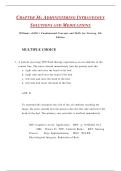
CHAPTER 36: ADMINISTERING INTRAVENOUS SOLUTIONS AND MEDICATIONS {Williams: deWit's Fundamental Concepts and Skills for Nursing, 5th Edition}
MULTIPLE CHOICE 1. A patient receiving TPN fluid therapy experiences an air embolus in the central line. The nurse should immediately turn the patient onto the: a. right side and raise the head of the bed. b. right side and lower the head of the bed. c. left side and raise the head of the bed. d. left side and lower the head of the bed. ANS: D To anatomically minimize the risk of the air embolus reaching the lungs, the nurse should turn the patient onto the left side and lower the h...
- Package deal
- Exam (elaborations)
- • 20 pages •
MULTIPLE CHOICE 1. A patient receiving TPN fluid therapy experiences an air embolus in the central line. The nurse should immediately turn the patient onto the: a. right side and raise the head of the bed. b. right side and lower the head of the bed. c. left side and raise the head of the bed. d. left side and lower the head of the bed. ANS: D To anatomically minimize the risk of the air embolus reaching the lungs, the nurse should turn the patient onto the left side and lower the h...
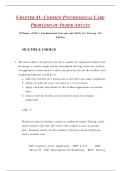
CHAPTER 41: COMMON PSYCHOSOCIAL CARE PROBLEMS OF OLDER ADULTS {Williams: deWit's Fundamental Concepts and Skills for Nursing, 5th Edition}
MULTIPLE CHOICE 1. The nurse adds to the plan of care for a cognitively impaired resident who has begun to wander night and day throughout the long-term care facility. An appropriate intervention to add to the plan of care for the resident with wandering behavior would be to: a. place the resident on a locked unit to prevent long-range wandering. b. obtain an order for wrist restraints or a vest restraint. c. apply a bracelet that alarms as the resident approaches an outside door. d. disc...
- Package deal
- Exam (elaborations)
- • 18 pages •
MULTIPLE CHOICE 1. The nurse adds to the plan of care for a cognitively impaired resident who has begun to wander night and day throughout the long-term care facility. An appropriate intervention to add to the plan of care for the resident with wandering behavior would be to: a. place the resident on a locked unit to prevent long-range wandering. b. obtain an order for wrist restraints or a vest restraint. c. apply a bracelet that alarms as the resident approaches an outside door. d. disc...
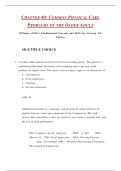
CHAPTER 40: COMMON PHYSICAL CARE PROBLEMS OF THE OLDER ADULT {Williams: deWit's Fundamental Concepts and Skills for Nursing, 5th Edition}
MULTIPLE CHOICE 1. An older adult patient on bed rest has been eating poorly. The patient is exhibiting abdominal distention and cramping and is passing small amounts of liquid stool. The nurse assesses these signs as an indication of: a. constipation. b. fecal impaction. c. diarrhea. d. GI tract infection. ANS: B Abdominal distention, cramping, and passage of small amounts of liquid stool are signs and symptoms of fecal impaction. The risk factors that contribute to this are bed re...
- Package deal
- Exam (elaborations)
- • 18 pages •
MULTIPLE CHOICE 1. An older adult patient on bed rest has been eating poorly. The patient is exhibiting abdominal distention and cramping and is passing small amounts of liquid stool. The nurse assesses these signs as an indication of: a. constipation. b. fecal impaction. c. diarrhea. d. GI tract infection. ANS: B Abdominal distention, cramping, and passage of small amounts of liquid stool are signs and symptoms of fecal impaction. The risk factors that contribute to this are bed re...
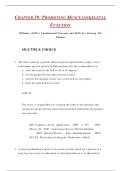
CHAPTER 39: PROMOTING MUSCULOSKELETAL FUNCTION {Williams: deWit's Fundamental Concepts and Skills for Nursing, 5th Edition}
MULTIPLE CHOICE 1. The nurse placing a patient following knee replacement surgery into a continuous passive motion (CPM) machine has the responsibility to: a. raise the head of the bed to 30 to 45 degrees. b. set the proper flexion and extension limits. c. elevate the machine at the foot of the bed on one pillow. d. keep the operated knee warm. ANS: B The nurse is responsible for securing the limb in the machine and setting the proper flexion and extension limits ordered by the prim...
- Package deal
- Exam (elaborations)
- • 18 pages •
MULTIPLE CHOICE 1. The nurse placing a patient following knee replacement surgery into a continuous passive motion (CPM) machine has the responsibility to: a. raise the head of the bed to 30 to 45 degrees. b. set the proper flexion and extension limits. c. elevate the machine at the foot of the bed on one pillow. d. keep the operated knee warm. ANS: B The nurse is responsible for securing the limb in the machine and setting the proper flexion and extension limits ordered by the prim...
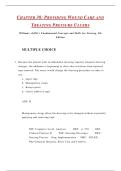
CHAPTER 38: PROVIDING WOUND CARE AND TREATING PRESSURE ULCERS {Williams: deWit's Fundamental Concepts and Skills for Nursing, 5th Edition}
MULTIPLE CHOICE 1. Because the patient with an abdominal dressing requires frequent dressing changes, the abdomen is beginning to show skin irritation from repeated tape removal. The nurse would change the dressing procedure in order to use: a. paper tape. b. Montgomery straps. c. Karaya paste. d. elastic adhesive tape. ANS: B Montgomery straps allow the dressing to be changed without constantly applying and removing tape. DIF: Cognitive Level: Analysis REF: p. 770 OBJ: Clini...
- Package deal
- Exam (elaborations)
- • 19 pages •
MULTIPLE CHOICE 1. Because the patient with an abdominal dressing requires frequent dressing changes, the abdomen is beginning to show skin irritation from repeated tape removal. The nurse would change the dressing procedure in order to use: a. paper tape. b. Montgomery straps. c. Karaya paste. d. elastic adhesive tape. ANS: B Montgomery straps allow the dressing to be changed without constantly applying and removing tape. DIF: Cognitive Level: Analysis REF: p. 770 OBJ: Clini...
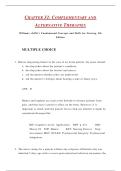
Test Bank for Fundamental Concepts and Skills for Nursing 6th Edition by Patricia A. Williams {Chapter 31-35}
Chapter 31: Pain, Comfort, and Sleep Chapter 32: Complementary and Alternative Therapies Chapter 33: Pharmacology and Preparation for Drug Administration Chapter 34: Administering Oral, Topical, and Inhalant Medications Chapter 35: Administering Intradermal, Subcutaneous, and Intramuscular Injections
- Package deal
- • 5 items •
- CHAPTER 33: PHARMACOLOGY AND PREPARATION FOR DRUG ADMINISTRATION {Williams: deWit's Fundamental Concepts and Skills for Nursing, 5th Edition} • Exam (elaborations)
- CHAPTER 34: ADMINISTERING ORAL, TOPICAL, AND INHALANT MEDICATIONS {Williams: deWit's Fundamental Concepts and Skills for Nursing, 5th Edition} • Exam (elaborations)
- CHAPTER 35: ADMINISTERING INTRADERMAL, SUBCUTANEOUS, AND INTRAMUSCULAR INJECTIONS {Williams: deWit's Fundamental Concepts and Skills for Nursing, 5th Edition} • Exam (elaborations)
- CHAPTER 31: PAIN, COMFORT, AND SLEEP {Williams: deWit's Fundamental Concepts and Skills for Nursing, 5th Edition} • Exam (elaborations)
- CHAPTER 32: COMPLEMENTARY AND ALTERNATIVE THERAPIES {Williams: deWit's Fundamental Concepts and Skills for Nursing, 5th Edition} • Exam (elaborations)
Chapter 31: Pain, Comfort, and Sleep Chapter 32: Complementary and Alternative Therapies Chapter 33: Pharmacology and Preparation for Drug Administration Chapter 34: Administering Oral, Topical, and Inhalant Medications Chapter 35: Administering Intradermal, Subcutaneous, and Intramuscular Injections

CHAPTER 32: COMPLEMENTARY AND ALTERNATIVE THERAPIES {Williams: deWit's Fundamental Concepts and Skills for Nursing, 5th Edition}
MULTIPLE CHOICE 1. Before integrating humor in the care of an Asian patient, the nurse should: a. develop jokes about the patient’s condition. b. develop jokes about the doctors and nurses. c. ask the patient whether jokes are understood. d. ask the patient’s feelings about hearing a joke or funny story. ANS: D Humor and laughter are used at the bedside to distract patients from pain, and they have a positive effect on the body. However, it is important to check with the patien...
- Package deal
- Exam (elaborations)
- • 20 pages •
MULTIPLE CHOICE 1. Before integrating humor in the care of an Asian patient, the nurse should: a. develop jokes about the patient’s condition. b. develop jokes about the doctors and nurses. c. ask the patient whether jokes are understood. d. ask the patient’s feelings about hearing a joke or funny story. ANS: D Humor and laughter are used at the bedside to distract patients from pain, and they have a positive effect on the body. However, it is important to check with the patien...
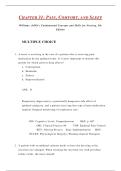
CHAPTER 31: PAIN, COMFORT, AND SLEEP {Williams: deWit's Fundamental Concepts and Skills for Nursing, 5th Edition}
MULTIPLE CHOICE 1. A nurse is assisting in the care of a patient who is receiving pain medication by the epidural route. It is most important to monitor this patient for which adverse drug effects? a. Constipation b. Headache c. Nausea d. Hypoventilation ANS: D Respiratory depression is a potentially dangerous side effect of epidural analgesia, and a patient receiving this type of pain medication requires frequent monitoring of respiratory rate. DIF: Cognitive Level: Comprehensi...
- Package deal
- Exam (elaborations)
- • 22 pages •
MULTIPLE CHOICE 1. A nurse is assisting in the care of a patient who is receiving pain medication by the epidural route. It is most important to monitor this patient for which adverse drug effects? a. Constipation b. Headache c. Nausea d. Hypoventilation ANS: D Respiratory depression is a potentially dangerous side effect of epidural analgesia, and a patient receiving this type of pain medication requires frequent monitoring of respiratory rate. DIF: Cognitive Level: Comprehensi...

CHAPTER 21: NUTRIENT CYCLES
Test bank for medical terminology Chapter 09 (Male Reproductive System) by Chabner: The Language of Medicine, 11th Edition
Chapter 37: Cardiotonic and Antiarrhythmic Drugs Introductory Clinical Pharmacology 12th Edition by Susan M Ford
Chapter 06: Lower Limb Lampignano: Bontrager’s Textbook of Radiographic Positioning and Related Anatomy, 9th Edition
Chapter 16: Care of Patients with Hematologic Disorders deWit: Medical-Surgical Nursing: Concepts & Practice, 3rd Edition